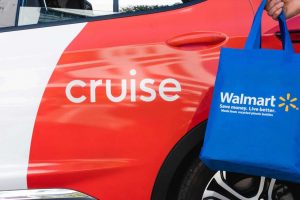Walmart investing in GM's Cruise self-driving car company

- Walmart is investing in Cruise, GM's majority-owned self-driving vehicle subsidiary, as part of a new $2.75 billion funding round for the company.
- The decision to invest comes about five months after the companies started working on a pilot program to use Cruise self-driving vehicles for deliveries in Scottsdale, Arizona.
- The investment round by Cruise was initially announced in January at $2 billion.
Walmart is investing in Cruise, General Motors' majority-owned self-driving vehicle subsidiary, as part of a new $2.75 billion funding round for the company.
The decision to invest comes about five months after the companies started developing a pilot program to use Cruise self-driving vehicles for deliveries in Scottsdale, Arizona.
"This investment is a marker for us – it shows our commitment to bringing the benefit of self-driving cars to our customers and business," Walmart U.S. CEO John Furner said in a blog post on Thursday. "We're excited to join Cruise's already impressive partner and investor ecosystem with the likes of GM, Honda and Microsoft as we work towards pioneering this emerging technology."
Furner said Walmart has "been impressed with Cruise's differentiated business model, unique technology and unmatched driverless testing." Walmart has announced partnerships with six autonomous vehicle companies, including Cruise, Ford Motor and Alphabet-owned Waymo. The pilot with Cruise remains under development but the investment is a strong vote of confidence in the company.
A Walmart spokeswoman said it will continue to work with other autonomous vehicle companies despite the investment in Cruise.
The investment round by Cruise was initially announced in January at $2 billion. It included Microsoft, GM, which acquired Cruise in 2016, and other institutional investors. The additional investment includes Walmart and other institutional investors, according to the company.
Cruise declined to breakdown the new funding by company. It brings Cruise's valuation to more than $30 billion.
"Self-driving cars will make transportation safer, cleaner and more accessible for everyone," Cruise CEO Dan Ammann said in a statement. "Making this happen requires a clear mission, world-class talent, great partners and a lot of capital."
Commercializing autonomous vehicles has been far more challenging than many predicted even a few years ago. The challenges have led to a consolidation in the autonomous vehicle sector after years of enthusiasm touting the technology as the next multitrillion-dollar market for transportation companies.
Some companies, such as Uber Technologies, have given up on developing the systems in-house, while others such as Zoox sold to Amazon. Alphabet's Waymo remains the most high-profile front-runner, operating a public autonomous vehicle fleet in Arizona
The addition of Walmart comes days after Cruise announced plans to expand operations to Dubai in 2023 through a deal to be the city's exclusive provider for self-driving taxis and ride-hailing services through 2029.
The announcements this week are significant for Cruise, which has been concentrating its self-driving vehicle testing in San Francisco. It has grown its registered testing fleet to more than 200 vehicles but hasn't yet announced when it plans to offer a robotaxi fleet to the public in the city. It initially planned to do so in 2019.
GM CEO Mary Barra last month said the company is "confident" that Cruise will launch and commercialize operations "sooner than many people think."
– CNBC's Melissa Repko contributed to this report.
Source: Read Full Article
